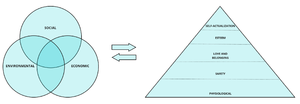
Sustainability is expressed as meeting present environmental, social, and economic needs without compromising these factors for future generations.[2][3][4] A practice cannot be said to be 'sustainable for X years/generations.' The use of any span of time disqualifies the activity. Sustainability is for perpetuity.
Sustainability also means greater efficiency in resource use, ultimately giving benefits to economic growth and overcoming poverty, as well as health and quality of life.
Sustainable design and development[edit | edit source]
Sustainable design and sustainable development are critical factors to sustainable living. Sustainable design encompasses the development of appropriate technology, which is a staple of sustainable living practices.[5] Sustainable development in turn is the use of these technologies in infrastructure. Sustainable architecture (see Green building) and agriculture are the most common examples of this practice.[6]
Sustainable development requires to be designed and implemented. In this respect, it also has a psychological dimension. It requires human abilities and skills. If humanity did not exist, there would be no need for sustainable development. A society is therefore required in which these skills are cultivated and knowledge about them is passed on. It is crucial how we experience and shape our relationship to the social, ecological and economic system, i.e. to the world.
People need sufficient food and security. This is nothing new and is the starting point of the United Nations Sustainable Development Goals. With the motivation theory of Abraham Maslow it can be explained that people are only then able to devote themselves to higher goals if they do not starve and fear for their safety. It seems like a dilemma that the disruption of the ecological balance contributes to starvation, so that those affected find it difficult to engage for this balance.
But humanity is complex and the ecosystem is even more so. Unfortunately, people have only a very limited ability to handle complex systems successfully. The philosopher Jean Jacques Roussou already drew the picture of humanity alienated from nature. Together with abstract thinking, humans have acquired the ability to form a society that can exist at least in the short term, although it seriously endangers or even destroys the basis for life itself.
According to self-determination theory, basic human psychological needs can be reduced to the experience of social relatedness, autonomy, and competence. Giving sustainability priority in meeting these basic needs appears to be a major challenge that we must address.
News and comment[edit | edit source]
 Vermont Green: The new US club attempting to do things differently, BBC Sport (May 11, 2022)
Vermont Green: The new US club attempting to do things differently, BBC Sport (May 11, 2022)  Low-technology: why sustainability doesn’t have to depend on high-tech solutions, The Conversation (Feb 18, 2022)
Low-technology: why sustainability doesn’t have to depend on high-tech solutions, The Conversation (Feb 18, 2022)
External links[edit | edit source]
- But, What Can I Do? Individual Actions That Make a Difference by L. Hunter Lovins, Wyatt King, Global Academy's Natural Capitalism Group
References[edit | edit source]
- ↑ Adams, W.M. (2006). "The Future of Sustainability: Re-thinking Environment and Development in the Twenty-first Century." Report of the IUCN Renowned Thinkers Meeting, 29–31 January 2006. Retrieved on: 2009-07-25.
- ↑ U.S. Environmental Protection Agency "What is sustainability?" Retrieved on: 2007-08-20.
- ↑ United Nations General AssemblyW (2005). 2005 World Summit Outcome, Resolution A/60/1, adopted by the General Assembly on 15 September 2005. Retrieved on: 2009-07-25.
- ↑ This widely accepted definition of Sustainability comes from the Brundtland Commission in a 1987 report for the Organisation for Economic Co-operation and Development (OECD), specifically referring to economic development. Other terms can replace "development", however, and the definition remains valid. "Activities", behaviors", "practices", "energy", "consumption" are some of those terms.
- ↑ Fritsch, Al; Paul Gallimore (2007). Healing Appalachia: Sustainable Living Through Appropriate Technology. University Press of Kentucky. p. 2. ISBN 0-8131-2431-X. Unknown retrieval date, revised: 2009-07-25
- ↑ Wheeler, Stephen Maxwell; Timothy Beatley (2004). The Sustainable Urban Development Reader. Routledge. ISBN 0-4153-1187-X.